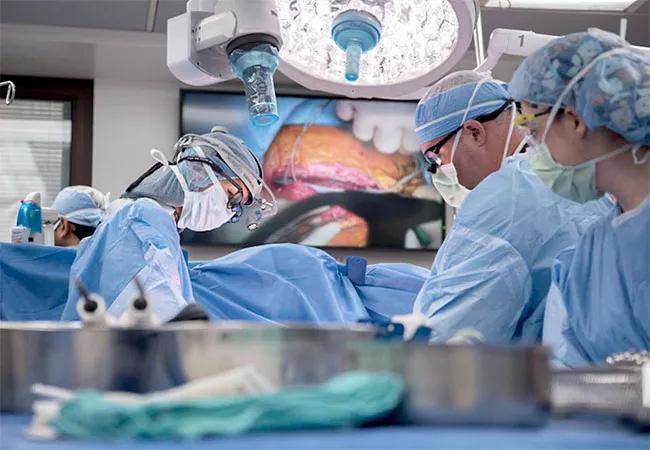Program balances new subspecialty certification requirements, offers robust training experience

The pathway to subspecialty certification in congenital cardiac surgery will soon change, requiring a two-year fellowship conferred by an Accreditation Council for Graduate Medical Education (ACGME) program and an increase in surgical volume and requisite index cases.
Advertisement
Cleveland Clinic is a non-profit academic medical center. Advertising on our site helps support our mission. We do not endorse non-Cleveland Clinic products or services. Policy
The change, handed down by the American Board of Thoracic Surgery (ABTS), represents a paradigm shift within the discipline, says Tara Karamlou, MD, MSc, a congenital heart surgeon in Cleveland Clinic’s Heart, Vascular & Thoracic Institute and program director of the congenital cardiac fellowship. Moving away from a one-year format or a nonaccredited training pathway is a change she has supported for years.
Cleveland Clinic launched its own congenital cardiac surgery fellowship program in 2020, becoming only the 12th ACGME-accredited program in the subspecialty.
“It takes a lot longer than one year to allow somebody to do the full spectrum of neonatal heart surgery, especially considering that most cardiac surgery residents have very little exposure to congenital surgery,” says Dr. Karamlou.
“In many cases, a trainee will get three months of dedicated congenital training during their six years of cardiac training. The physiology, anatomy, and the whole congenital community is very different than adult acquired cardiac surgery.”
This conversation has been a source of debate since the fellowship was formally recognized in 2007. In 2023, candidates seeking subspecialty certification will be required to complete two consecutive years of an ACGME-recognized fellowship and adhere to new surgical volume and index cases requirements.
The ABTS mandates 150 major pediatric congenital cardiac surgeries over two years, with a minimum of 50 as the primary surgeon within the first year.
“There will be a gradual uptick in operative complexity to increase trainees’ familiarity with highly complex cases,” says Dr. Karamlou. She says the new format will also include other aspects of specialty care, including rotations in critical care, cardiac catheterization and echocardiography to get a sense of the multidisciplinary experience of caring for congenital cardiac patients.
Advertisement
“Reading intraoperative echoes, leading hybrid procedures in the Cath Lab, and caring for your patients in the ICU setting are all critical elements of being a congenital heart surgeon that we were previously unable to expose trainees to because of time constraints,” she says.
Feedback from former trainees also inspired protected research time in the new two-year format to allow fellows to pursue a scholarly interest and leverage Cleveland Clinic’s vast research network.
John Costello, MD, Cleveland Clinic’s first graduate from the fellowship program, joined the team in August 2022. His appointment to attending follows more than a decade of specialty and subspecialty training.
He says the “volume, complexity of cases and global referral environment made it a robust and rigorous training experience,” giving trainees the confidence and surgical acumen to practice independently once they’ve graduated.
The patient volume places it in the top echelon of congenital centers in the U.S. In 2021, the center completed more than 700 congenital cardiac cases between Cleveland Clinic main campus and Cleveland Clinic Akron Children’s.
Trainees are also exposed to varied pathologies and congenital cardiac surgeries for patients across the lifespan—from fetal and neonatal care to older adults. While many other programs are housed in a children’s hospital, where fellows may get to visit the adult side for a couple of months, here they can see pediatric and adult patients every day.
They work on complex cases such as the Norwood procedure, double switch, complex valve repairs in newborns, multiple redo adult congenital cases, heart transplantation and mechanical circulatory support and foundational cases like tetralogy of Fallot repair, atrioventricular canal defects, coarctations and ventricular septal defect.
Advertisement
Dr. Costello adds, “There are techniques and cases that I have seen in this past year that are novel to the point of actually being first developed and described here.” Hani K. Najm, MD, Chair of Pediatric and Congenital Heart Surgery, developed the first surgical technique to successfully repair a transseptal anomalous left coronary artery arising from the right coronary sinus.
With his formal training behind him, Dr. Costello says a new era of training has begun.
“You have to rely on the mentorship of your senior partners to help you as you now take on more responsibility,” he says. “And I think the mentorship from all of the congenital surgeons has made this transition seamless and made me feel welcomed and supported.”
He adds, “I had never seen Cleveland Clinic until I drove into Cleveland on the Sunday night before I started work the next day. I had never trained here. The team had never met me in person. And in my 12 months, the team taught me daily and cared for me as a person from the very start, and it immediately became the most robust year of my 12-plus years of training. I think that is more of a testament to the program than any other words I could say.”
Advertisement
Advertisement

Innovative hardware and AI algorithms aim to detect cardiovascular decline sooner

Experts advise thorough assessment of right ventricle and reinforcement of tricuspid valve

Reproducible technique uses native recipient tissue, avoiding risks of complex baffles

A reliable and reproducible alternative to conventional reimplantation and coronary unroofing

Program will support family-centered congenital heart disease care and staff educational opportunities

Case provides proof of concept, prevents need for future heart transplant

Pre and post-surgical CEEG in infants undergoing congenital heart surgery offers the potential for minimizing long-term neurodevelopmental injury

Science advisory examines challenges, ethical considerations and future directions